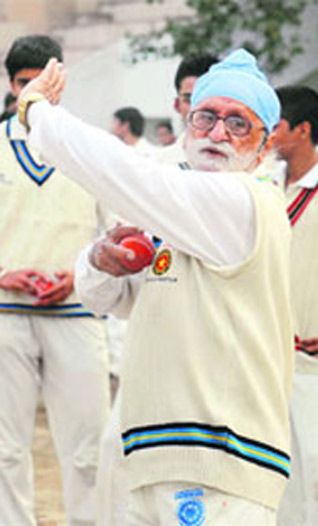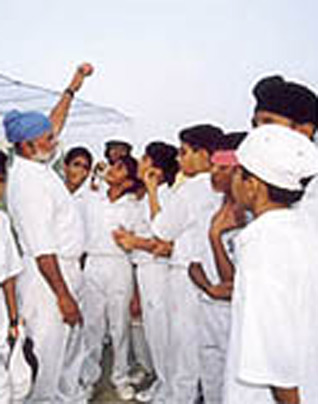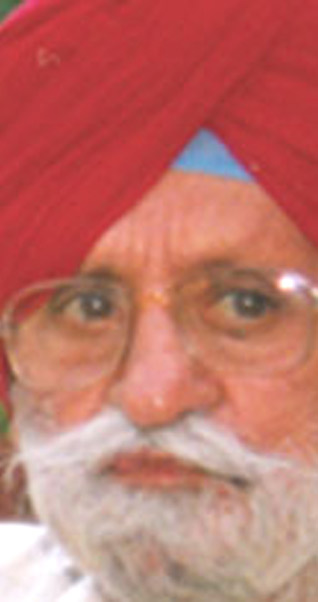Sports
Master Cricket Coach Gurcharan Singh:
A Survivor of Partition and the 1984 Pogroms, He Gives, and Gives ...
M.S. UNNIKRISHNAN
Seventy-seven years sit lightly on his slight shoulders, as he keeps a punishing schedule every day of the week -- from 9 a.m to 7 p.m
Eighteen years after he retired from the Sports Authority of India in New Delhi as the chief cricket coach, Gurcharan Singh is still as active as ever.
At a time when age is the raging flavour of Indian sports, the likes of Gurcharan Singh are a vanishing breed. He quietly trains hundreds of boys in the fine art of cricket -- batting, bowling, fielding -- at an age, when most of his contemporaries have faded away from the scene.
Over the past five decades, he has trained generations of cricketers, including at least a dozen of India's star players.
Yet, Gurcharan Singh does not rest on his laurels.
Life has been a roller-coaster ride, but he takes pride in the fact that his ceaseless hard work and total commitment to cricket has helped him weather many a storm and carry on.
He has been associated with cricket, first as a player, and then as a coach, for the past 62 years, and his passion for the game still burns bright. He trains more than 250 boys at the Yamuna Sports Complex, owned by the Delhi Development Authority, and the Arwachin Bharati School in the Vivek Vihar area of East Delhi.
He has been the coach of many leading public schools of Delhi, and some colleges too, but due to his advancing age, he has cut down on travel, and now solely concentrates on these two coaching centres which are a stone’s throw apart from each other.
Even when the Yamuna Sports Complex was shut down for two-and-a-half years for the 2010 Commonwealth Games construction work, Gurcharan Singh did not stop his coaching. He simply shifted his coaching centre to another DDA centre -- the Chilla Sports complex.
During the Partition of Punjab he lost everything, and came to Patiala in 1947 as a refugee.
Gurcharan Singh had no idea how his life would pan out in a new land. But thanks to the munificence of Maharaja Bhupinder Singh, he got a toe-hold in Patiala, and due to his benefactor’s guidance, started playing cricket. Cricket opened up new opportunities for Gurcharan, as he first played for Southern Punjab and a 'century' against Railways in the Ranji Trophy altered his life forever.
The then manager of the Railway team, Ketharaman, took him into the Railway fold, and at the direction of this very same official, Gurcharan joined the NIS Patiala for a cricket coaching diploma.
Playing Ranji Trophy for Railways was a big deal then as seven of the players were all-India stars, including captain Lala Amarnath, Dattu Phadkar, B. B.Nevalkar, Nari Contractor, Buddhi Kundaran and Vasant Ranjane.
Gurachan’s cricket acumen and talent were evident from the fact that from the No. 11 spot, he soon graduated into the No 6. batting slot in the Railways team, comprising of so many star players.
After passing out of the NIS, he joined the institute as a cricket coach, before becoming the head coach of the SAI Centre in Delhi. In between, he became the national coach (1986-87) of the Board of Control for Cricket in India (BCCI), the BCCI zonal coach (North) from 1977 to 1983, the Maldives cricket coach in 1985, and also the director of the Pace Bowling Academy, launched jointly by the BCCI and SAI at the Laxmibhai National College of Physical Educaiton (LNCPE), Gwalior in 1992-93, when Madhavrao Scindia was the BCCI president.
This was the first pace bowling academy in the country, and the later ones were all clones of the model established by Gurcharan Singh at Gwalior.
The 1984 anti-Sikh pogroms in Delhi and the rest of India almost set the clock back for Gurcharan, but he survived the ordeal, thanks to some of his trainees, who shielded and protected him from the murdering mobs.
But Gurcharan Singh was unfazed and unshaken. He now trains scores of young boys under the banner of the Dronacharya Cricket Foundation and also runs two cricket clubs -- Delhi Blues and National Stadium Cricket Centre.
He not only trains players, but also gives a window of opportunity to the talented ones to play in the DDCA League through these clubs. He also takes the Delhi Blues Club team to England every alternate year, which gives the players the kind of foreign exposure they would not have otherwise got.
Presently, 10 coaches work under him, and he trains boys of all age groups till they are ready to move out to a higher grade. Many have come out of this wizened coach’s training centres and made a mark in the game.
He lives in the present, and does not wallow in the past.
"The past was good, but the present is better", he says with tons of enthusiasm. "Hard work has been my motto, and when you are up and about, and always on the field, you never feel that you are past your prime. I move with the young and talented, and this keeps me motivated and going", Gurcharan says.
No surprise, Gurcharan serves the game with the same verve and vitality at the age of 77 as when he was 17 years old!
[Courtesy: Tribune. Edited for sikhchic.com]
November 25, 2012
|
|
Conversation about this article
1: Ravinder Singh Khalsa (USA), November 26, 2012, 10:37 PM.
What an amazing Sardar! Much love and respect to you, brother ...
2: Rohit Kumar (Pehowa, Haryana, India), October 07, 2013, 5:24 AM.
This inspires me to become a good cricketer.





